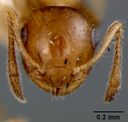Acrobat Ants
Crematogaster
Classification
- Phylum: Arthropoda
- Subphylum: Hexapoda
- Class: Insecta
- Order: Hymenoptera
- Superfamily: Formicoidea
- Family: Formicidae
- Subfamily: Myrmicinae
- Tribe: Crematogastrini
- Genus: Crematogaster
Pronunciation
How to pronounce Crematogaster: //krɛmətoʊˈɡæstər//
These audio files are automatically generated. While they are not always 100% accurate, they are a good starting point.
Images






Summary
Crematogaster, known as acrobat ants or cocktail ants, are a diverse genus of ants recognized for their unique heart-shaped gaster, arboreal habits, and complex social behaviors. They play significant roles in their ecosystems as predators and mutualistic partners.
Physical Characteristics
Two sizes: workers (2.5-3.5 mm), queens (about twice as long); heart-shaped gaster distinguished by dorsal articulation to the postpetiole.
Identification Tips
Distinguished by a heart-shaped gaster as viewed from above and characteristic raising of the abdomen when alarmed.
Habitat
Found both outdoors in trees and indoors around electrical wires; prefers moist, dark environments including wood collections and under rocks.
Distribution
Cosmopolitan; notably Northern and desert species with a significant presence in the warm, humid Southeast.
Diet
Feeds on honeydew, extrafloral nectar, scavenged protein, carrion, and various insects including wasps and grasshoppers.
Life Cycle
Queen mates during a nuptial flight; can produce unfertilized eggs that become males in absence of a queen.
Reproduction
Nuptial flights occur where queens mate once and retain sperm for life; some large workers can reproduce under certain conditions.
Predators
Other insect species, particularly larger ants or predatory insects that can consume ants.
Ecosystem Role
Participate in mutualism with plants, provide pest control through predation, and contribute to nutrient cycling in their environments.
Cultural Significance
Commonly known as acrobat or cocktail ants due to their distinct behavior and morphology.
Collecting Methods
- Hand collecting
- Baits
Preservation Methods
- Alcohol preservation
- Pinning
Tags
- Crematogaster
- acrobat ants
- cocktail ants
- hymenoptera
- ants
- insects
- mutualism